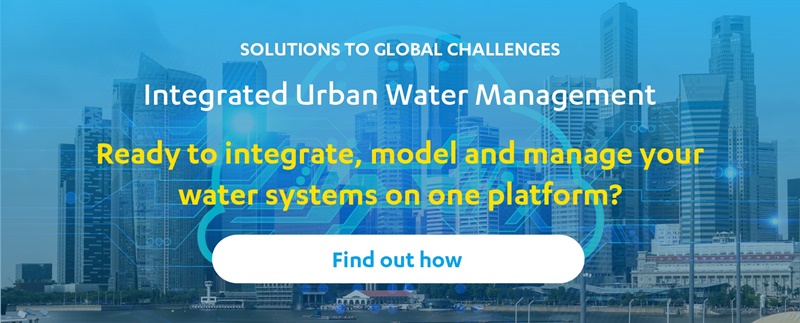Today, cities all over the world are dealing with a range of global pressures, such as rapid urban growth, severe climate changes and aging infrastructure to provide safe and resilient water supply, collect sewage, secure a minimum spill of untreated water and reduce risks of flooding. Because of these challenges, cities experience difficulties in finding efficient and sustainable ways to manage water. While remaining with existing water infrastructure, including plants, pipes and networks, the goal is to be able to quickly adapt to the swiftly changing world surrounding us in order to create greater value throughout various aspects of urban water management. Fortunately, all this is possible by leveraging on the benefits of today’s technology and thereby adopting an integrated approach to urban water management.
The growing need of adjusting to changing conditions
In a time of digital transformation with fast technological developments, such as Big Data, Internet of Things (IoT) as well as new ways of collecting, accessing and augmenting data, it is no wonder that we ask ourselves if traditional ways of analysing and managing water are outdated.
With the multifaced, comprehensive and complex urban water challenges which decision makers and water professionals are being confronted with daily, there is a growing need to be flexible, revisit decisions and quickly adjust to changing conditions. Focusing on understanding how different components impact each other in the urban water cycle and how our urban water systems perform as a whole is vital to improve operations at a lower unit cost, with high efficiency, and at the same time comply with environmental standards. This approach does not necessarily hold the answer to all urban water challenges, but offers a more complete set of options for dealing with the larger and more complex urban water challenges we are experiencing today. Digital transformation and new technologies are important drivers to enabling this approach.
Dedicating technology to support an integrated approach
Basically, it is about combining the best of the past with new possibilities of the future. While innovation and progression are important for those leading the way, daily pains and challenges of users need to be solved by securing sustainable management and operations. In other words, merging expertise and experience-based domain knowledge with the opportunities provided by new technologies, allow for development of innovative urban water solutions and products. In changing times, flexibility and adaptability are key words for efficient decision-making, built on a sound and profound knowledge base.
In this transformation the focus must be on developing technology that drives efficiency without compromising security and resilience. It needs to include full integration across the urban water systems while offering a user-friendly experience and easy accessibility. Based on advanced numerical modelling, providing tools for in depth analysis and understanding of how urban water systems are performing is an important way forward. Combining this practice and embracing new technologies, such as data visualisation, efficient screening methods and Cloud solutions where data is processed in real time, will provide better solutions for an integrated approach to both management and operations of urban water.
Finding the solution in a world of constant evolving climate change and urbanisation
Fully solving the complex management of urban water systems in a constantly changing world of climate change and urbanisation may require more than an integrated approach to urban water management. It will, most likely, also require a holistic approach. Up until now, water management in urban areas has, in many cases, focused on optimising and managing individual components rather than looking at the bigger picture. From the holistic perspective, innovation, resources, knowledge transfer, organisation and legal issues are as important as technology. Nonetheless, by utilising technology to adopt a more integrated approach, it is possible to create significant value and take a step in the direction of ensuring a sustainable future with a more holistic approach to drive efficiency in urban water management.
At DHI, we utilise advanced technology to adopt a fully integrated approach to urban water management across water distribution and collection systems. Discover how the recent release of MIKE+ offers new and exciting features for an improved user experience with integrated 2D flooding, flexible meshing, seamless integration with the pipe network as well as build-in result visualisation.









